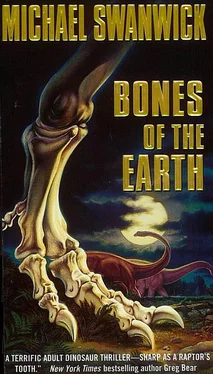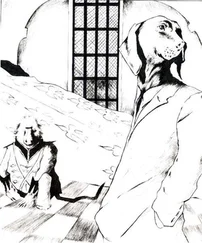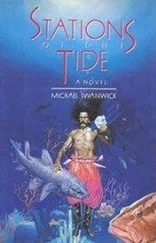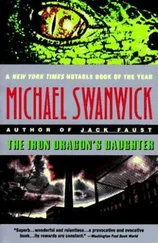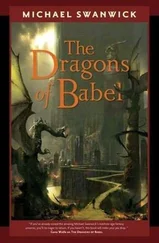But whenever she’d started to wander away from the river, something had drawn her back. She’d get bored, or tired, or distracted. A pattern began to emerge. So she started observing the animals themselves, to see how their torcs kept them in their designated areas.
And found that whenever they reached the limits of their range, they’d grow bored, or tired, or distracted, and turn back. Once or twice, she noticed them grow randy and amble off in search of a mate. Never outward. Always inward.
“Stop beating up on yourself, Salley,” Molly Gerhard said. “Word of honor, Griffin isn’t using the controller. Look. I don’t even particularly like the man. But I swear to you, he wouldn’t do that.”
* * *
Salley was a romantic. It almost went without saying. Any person who squandered all her life and intellect on an underpaid career laboriously grinding fossils out of rocks just because these stones had once been the bones of an animal that millions of years ago had kicked Mesozoic butt was of necessity a romantic. It went with the territory. It was why so many paleontologists wore funny hats.
She wanted to believe Molly Gerhard.
But she wasn’t about to turn off her brain to do so.
So, after she’d gotten rid of the woman, Salley went back to her creek and as far up it as she could before feeling so tired and weary that she simply couldn’t go one step further. It was a bright little glen with ferns around the edges, and a clear mossy space under the trees she’d almost reached twice before, but never set foot upon.
She took Jimmy’s Mont Blanc out of her pocket.
Then she threw it gently ahead of her, onto a soft patch of moss. It glinted, bright and golden, in the sunlight.
It would be the easiest thing in the world to walk ahead and pick it up. Yet she did not. Go get it, she thought. Jimmy will be pissed if you lose it. It’s important to him. Walk over and pick it up.
But she didn’t. She simply didn’t want to. No matter how important the pen was, she wasn’t about to go after it.
Which was how she knew for sure that Griffin really was controlling her.
* * *
On her way back to her cottage, she picked up an axe from the tool shed by the woodpile. Then she went into the bedroom she and Griffin had shared and turned the bed into a pile of kindling. After which she dragged the mattress outside, piled the broken bedframe atop it, and doused it with cooking oil.
Then she set it afire.
She wasn’t sure who she was angrier at—Griffin or herself. Griffin had lied to and betrayed her. Gertrude, on the other hand, had as good as made a whore of her. No man who was so afraid of what she might do that he’d use a device to control her could possibly be the great love of her life. She couldn’t love such a man.
She couldn’t even respect him.
Why wasn’t the bastard here, so she could take this axe to him? It was typical of Griffin that when the time came to take the heat, he was nowhere to be found.
Gertrude too, for that matter.
Seething, she went into the bedroom to pack her few possessions into the travel case. Then she had to get this monstrosity off her neck. There had to be a metal saw or some bolt cutters around here somewhere. She’d…
She stopped.
There was an envelope on the dresser. Funny she hadn’t seen it before. She picked it up. Something was written on it, in her own hand.
It was addressed to her.
14. Intraspecific Communication
Lost Expedition Foothills: Mesozoic era. Cretaceous period. Senonian epoch. Maastrichtian age. 65 My B.C.E.
With dreamlike slowness, the great beasts browsed in the moonlight.
Oneirosaurus was the last and largest of the supersauropods. It was a late, final flowering of the Titanosaurinae, rare as rare, and a creature that all logic said properly belonged not in the late Cretaceous, but in the Jurassic, when giant sauropods were common. To see one was to refuse to believe it existed. To see five scattered across the river valley, as now, eating the jungle down to stubble, was a privilege Leyster knew he would cherish for the rest of his life.
Alone of all the creatures in the valley, Oneirosaurus never slept. It couldn’t afford to. It had to keep eating, moving its little head steadily, monotonously, from side to side until all the vegetation within reach was gone, and then taking a ponderous step or two forward to repeat the process. All day and all night it did this, just to keep alive.
It was not much of a life, but one they seemed dimly to enjoy. And it was one that could last for centuries. Leyster had heard rumors that individuals had been identified as being over five hundred years old.
Wonderful as those giant gray shadow-beasts were to look at, though, he knew that Lai-tsz hadn’t brought him out here for esthetic reasons. She was a pragmatist. Her mind just didn’t work that way.
“So what is it that you wanted me to see?” he asked.
“Not to see. To hear. To feel.”
“Then what—?”
“Shhh. Wait.”
She wrapped her arms protectively around her swollen belly, and stared out over the land. Prospect Bluff had a view second only to Barren Ridge—and no carnivores nested here. A touch of wind blew her hair forward, and she raised her chin slightly, as if to meet it.
Leyster found himself wishing he had the skill to paint in oils, so he could capture her as she was then, with the land a symphony of grays behind her, and the River Styx a gleam of silver meandering through it. There was something heroic about a pregnant woman. She carried all the hopes and fears of a new life within her body. Nobody could deny that she was engaged in serious business.
After a while, Lai-tsz made a face and said, “Little Turok is active tonight.”
“Have you decided on a name yet?”
“For the English name, I’m leaning toward Emily if it’s a girl, and Nathaniel if it’s a boy. For the Chinese—there! Listen!”
At first, Leyster heard nothing. He turned to Lai-tsz to say so, but something about her stance, the way she held her head, told him that she, at least could hear something. Whatever it was, though, had to be subtle and extremely easy to miss.
He willed himself perfectly still. He quieted all conscious thought.
He waited.
Slowly he became aware of a low, pervasive rumbling, like the inaudible undertones produced by the deepest pipes of a church organ. He felt more than heard it, in his chest and the pit of his stomach, a sound so deep into the bass that he had to wonder if he were fantasizing it.
“I…hear it, I think. Something. But what is it?”
Lai-tsz shivered in a kind of ecstasy. “Infrasound.”
“What?”
“I didn’t want to say anything before I got independent confirmation that there really is something there. They’re speaking to each other infrasonically—with sound waves of such low frequency that you and I can’t actually hear them.”
“My God,” Leyster said. “You mean they’re communicating with each other?”
“With each other, with oneirosaurs outside the valley—who knows? Infrasound can travel for miles. They could be speaking with kin beyond the horizon. Elephants use infrasound to communicate with each other over huge distances.”
“How did you discover this?”
“It’s Turok’s discovery, actually. The little floater grows very still whenever the oneirosaurs speak. Child-to-be would be bouncing around actively, and then suddenly stop, listening. After a while, I made the connection. Whenever Turok got still like that, there’d be an oneirosaur in sight. Either that, or else a tyrannosaur.”
“Tyrannosaurs, too?”
“Yes, I really do think so.”
Читать дальше
